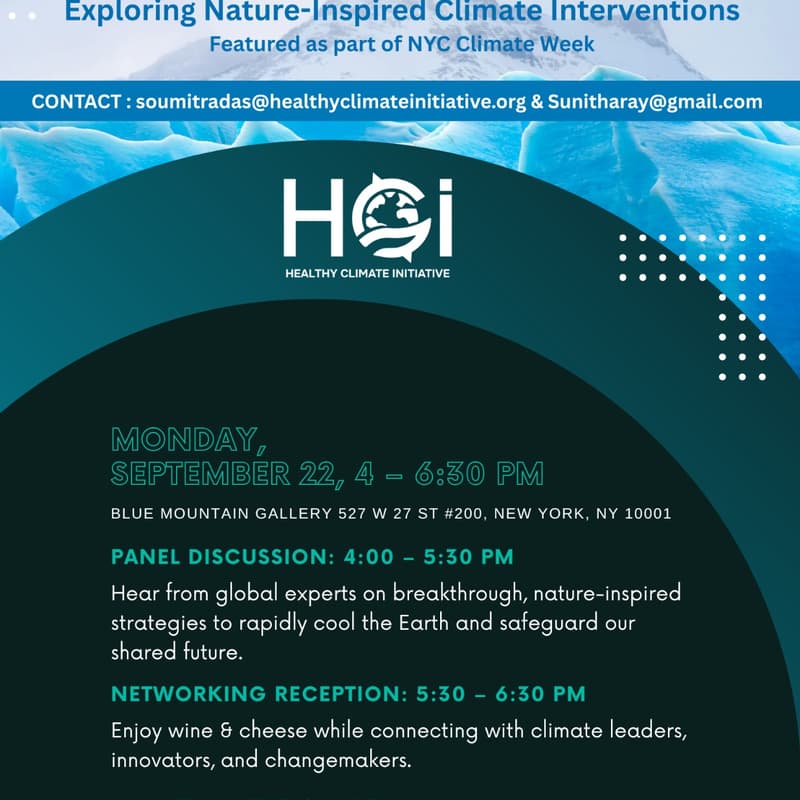Restoring a Healthy Climate: Nature Inspired Interventions to cool the planet and rekindle hope
Global temperature increases and their impacts are accelerating faster than scientists projected. Irreversible climate tipping points in the Amazon, Arctic, North Atlantic and elsewhere may soon be triggered, threatening to push the climate system beyond humanity’s control. If current trends continue, vast regions of the planet could become unlivable, triggering mass migration and displacing hundreds of millions of people by mid-century.
Yet political leaders continue to delay meaningful action. Is there any realistic hope left?
Yes—there is. A promising set of interventions, modeled on processes already at work in nature, may help us potentially stabilize and even restore a safe and healthy climate by rapidly and relatively inexpensively reducing global temperatures.
These approaches – such as brightening clouds, releasing reflective particles in the stratosphere, enhancing surface albedo, protecting snow and ice and large scale eco restoration– could protect vulnerable communities from extreme weather impacts, while reducing local and global temperatures rapidly at relatively low cost
These cooling interventions, along with accelerated emission reductions and large scale carbon dioxide and methane removal - a three pillared strategy called the Climate Triad - can lower average temperature increases to well below 1° C in the coming decades.
Thus, we must be prepared to responsibly explore climate interventions that demonstrate their safety and effectiveness rather than shy away from the research, development, and governance frameworks required to assess and potentially deploy them. At the same time, we must acknowledge the understandable concerns from many across the political spectrum who worry about risks, unintended consequences, and governance
Our distinguished panel will explore:
• The scope of the climate emergency.
• The most promising nature-inspired interventions
• The concerns with climate interventions, and how they can be addressed.
• What must be done to build political will, public trust, and governance frameworks.
The extreme climate challenges and opportunities for cooling in India and South Asia will be given particular emphasis in our conversation.
There will be plenty of time for the audience to engage with the panel.
Following the conclusion of the panel everyone is warmly welcome to stay for wine, cheese and thought-provoking artwork by Elizabeth Bisbig.
Panelist:
· Dr. Soumitra Das is the executive director and co-founder of the 𝐇𝐞𝐚𝐥𝐭𝐡𝐲 𝐂𝐥𝐢𝐦𝐚𝐭𝐞 𝐈𝐧𝐢𝐭𝐢𝐚𝐭𝐢𝐯𝐞 (𝐇𝐂𝐈), located in the US and India, to regenerate a healthy climate and safeguard future generations. An engineer and strategist by training, Dr. Das has held leadership roles in the U.S. government, Fortune 500 companies, and global telecom standards bodies.
· Mr. Milke Tidwell is the founder and director of the Chesapeake Climate Action Network, a grassroots nonprofit organization dedicated to raising awareness about the impacts and solutions associated with global warming in Maryland, Virginia, Washington D.C., West Virginia, and nationwide.
· Dr. Jon Schull is Co-founder, with Biodiversity for a Livable Climate, of the EcoRestoration Alliance, which aims to tackle climate change through restoration of depleted soils and degraded habitats, and of e-NABLE, an online philanthropic community that creates free open-source 3D-printed prosthetic hands and arms for those with upper limb differences.
· Dr. Jyoti Singh is a postdoctoral scientist at Columbia Climate School with expertise in climate modelling and agricultural impact analysis.
Moderator:
· Mr. Herb Simmens, the author of A Climate Vocabulary of the Future. a cofounder of the Healthy Planet Action Coalition, and the host of the Climate Emergency Forum podcast.
Host:
· Ms. Sunitha Ray, is a digital supply chain, AI and technology transformation executive and a Board Advisor for digital sustainability, based in New York City. She is currently a Co-Founder of Digital Sustainability Forum with MIT Energy Environment and Sustainability Network (MIT EESN), part of the MIT's Global Supply Chain and Logistics Excellence (SCALE) Network, Ambassador for MIT's Sustainable Supply Chain Lab and a MIT Technology Review Global Panelist.
About Healthy Climate Initiative (HCI)
HCI, a nonprofit in the US and India, is driving research and innovation to cool the planet, protect glaciers, and remove excess CO₂ while empowering communities through education, reforestation, and policy engagement. From field trials at the Chhota Shigri Glacier with IIT and the Bright Ice Initiative to advocacy in South Asia, we are building the science and readiness needed to confront escalating climate risks.
